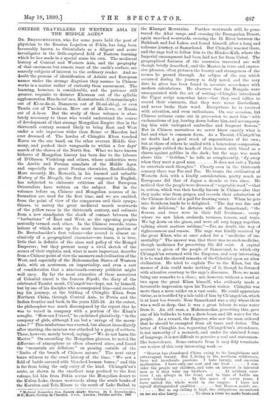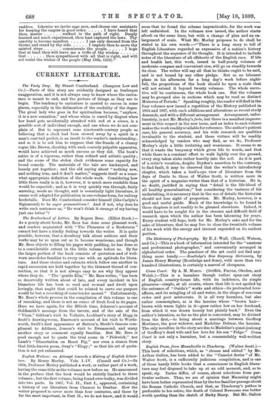CHINESE TRAVELLERS IN WESTERN ASIA IN THE MIDDLE AGES.*
DR. BRETSCHNEIDER, who for some years held the post of physician to the Russian Legation at Pekin, has long been favourably known to Orientalists as a diligent and acute investigator in the little-explored field of Eastern learning which he has made in a special sense his own, The medilaval history of Central and Western Asia, and the geography of that enormous but remote tract of the earth's surface, are scarcely subjects of interest to the ordinary reader. And no doubt the process of identification of Asiatic and European names under the strange disguises they assume in Chinese .works is a matter rather of curiosity than amusement. The learning, however, is considerable, and the patience still greater, requisite to disinter Khorazm out of the syllabic agglomeration Hua-la-tsz'-mu, Konstantmuh (Constantinople) out of Ki-sz-da-ni, Damascus out of Di-mi-shi-gi, or even Tauriz out of T'ao-lai-sz, Mery out of Ma-li-wu, or Russia out of A-lo-sz. But the study of these volumes is abso- lutely necessary to those who would understand the course of development of that strange Mongolian Empire that in the thirteenth century seemed likely to bring East and West under a sole imperium wider than Rome or Macedon had ever dreamed of. The hordes of Chinghiz Khan touched Korea on the one hand, on the other overran Middle Ger- many, and pushed their vanguards to within a few days' march of the shores of the North Sea. What we have known hitherto of Mongolian history has been due to the labours of D'Ohsson Virdeloup and others, whose authorities were the Arabic and Persian annalists of the Middle Ages, and especially the great Persian chronicler, Rashid-eddin. More recently, Mr. Howorth, in his learned and valuable History of the Mongols, the first ever composed in English, has subjected to elaborate criticism all that European Orientalists have written on the subject. But in the volumes before us, Chinese and Mongolian sources of in- formation are used for the first time, and we are enabled, from the point of view of the conquerors and their sympa- thisers, to survey the great medimval march westwards of the yellow races in the thirteenth century, and estimate from a new standpoint the shock of contact between the " barbarians " of East and West, as the opposing peoples mutually termed each other. In the Chinese records, trans- lations of which make up the most interesting portion of Dr. Bretschneider's first volume—the second is almost ex- clusively of a geographical character—we learn, it is true, little that is definite of the aims and policy of the Mongol Emperors ; but they present many a vivid sketch of the scenes of their exploits, and, what is more important, describe from a Chinese point of view the manners and civilisation of the West, and especially of the Mahommedan States of Western Asia, with an acuteness, an impartiality, and even a sort of consideration that a nineteenth-century publicist might well envy. By far the most attractive of these narratives of Celestial travel is the famous Siyuki, the diary of the celebrated Taouist monk, Ch'angch'un—kept, not by himself, but by one of his disciples who accompanied him—and record- ing his journey, at the bidding of Chinghiz Khan, from Northern China, through Central Asia, to Persia and the Indian frontier and back, in the years 1221-24. At the outset, the philosopher was much discomposed by the report that he was to travel in company with a portion of the Khan's seraglio. "How can I travel," he exclaimed plaintively, "in the company of girls, although I am but a 'savage of the moun- tains ?' " This misfortune was averted, but almost immediately after starting, the caravan was attacked by a gang of robbers. These, however, merely bowed, saying,—" We do not harm the Master." On ascending the Mongolian plateau, he noted the difference of atmosphere so often observed since, and found the "mountain air delicious" on passing outside of the "limits of the breath of Chinese nature." The next entry bears witness to the cruel history of the time, "We saw a field of battle covered with bleached human bones ;" and this is far from being the only entry of the kind. Ch'angch'un's route, as shown in the excellent map prefixed to the first volume, led him from Pekin across the Mongolian desert to the Kulun. Lake, thence westwards along the south banks of the Kerulun and Tola Rivers to the south of Lake Baikal, to • Medimtal Researches from Easter's Aeiatio Sources. By E. Bretschneider, M.D., Iemb. Corresp. d.e l'Institat. 2 vols. London: Trebner and Co.
the Khangai Mountains. Further westwards still, he pene- trated the Altai range, and crossing the Dsungarian Desert, again marched westwards, crossing the Ili River between the Balkhash and Issi Lakes, and found himself, after a long, and toilsome journey, at Samarkand. But Chinghiz was not there,
and the sage had to follow him to the Hindoo-Kuh, where the Imperial encampment had been laid not far from Cabal. The geographical features of the countries traversed are well though briefly described ; and the Master, in terse and expres- sive phrases, often pictures the beauty and strangeness of the scenes he passed through. An eclipse of the sun which occurred during the journey is duly noted, and the very date he gives has been found in accurate acconia nee with modern calculations. He observes that the Mongols were
unacquainted with the art of writing—Chinghiz introduced the Uigur script somewhat later—that they used tallies to record their contracts, that they were never disobedient, and never broke their word. Everywhere he is received with attention, and even enthusiasm. On one occasion, 144 Chinese artisans came out in procession to meet him "with exclamations of joy, bowing down before him, and accompany- ing him with variegated umbrellas and fragrant flowers." But in Chinese narratives we never know exactly what is fact and what is common form. As a Taouist, Ch'angch'un no doubt had a good stock of superstitions of his own ; but at those of others he smiled with a benevolent compassion. His people rubbed the heads of their horses with blood as a charm against goblins in the dark ; but the sage was much above this. "Goblins," he tells us complacently, "fly away when they meet a good man It does not suit a Taoist to entertain such thoughts." Clearly even in the thirteenth century there was Tao and Tao. He treats the civilisation of Western Asia with a kindly consideration, pretty much as Europeans did that of Japan a decade or two since. He noticed that the people wore dresses of "vegetable wool "—that is, cotton, which was then hardly known in China—also that they make wine from grapes, and records their admiration of the Chinese device of a pail for drawing water. When he gets into Southern lands he is delighted. "The day was fine and the air delicious," he dictates while at Samarkand; "the flowers and trees were in their full freshness ; every.
where we saw lakes, orchards, terraces, towers, and tents. We lay down on the grass, and were all very happy together, talking about matters sublime,"—Tao, no doubt, the way of righteousness and reason. The sage was kindly received by the great Khan, who at once asked for a "medicine of im- mortality." The answer was, that there was no such medicine, though medicines for preserving life did exist. A capital account is given of the people of Sa,marcand, to which city Ch'angch'un returned with the Emperor, and very interesting it is to read the shrewd remarks of the Celestial upon an alien civilisation. He tried to explain Tao to the Khan, but the
master of Asia could make nothing of it, though he listened with attentive courtesy to the sage's discourse. Here we must bring our remarks to a close ; not, however, without a word or
two upon the great Khan himself, who evidently made a favourable impression upon his Taouist visitor. Chinghiz was more than a mere raider on a vast scale. He could appreciate virtue, as is testified by a tale told of him by Ch'angch'un, which
is at least ben trovato. Near Samarkand was a city where there was a well so deep, that it was a great labour to raise water from it. An old man, a Mahommedan, perceiving this, gave
one of his bullocks to turn a draw-beam and lift water for the people. As a reward, the Emperor, who saw the man, ordered that he should be exempted from all taxes and duties. The letter of Chinghiz, too, requesting Ch'angch'un's attendance, is not unworthy of a monarch, and under its sinicised forms of language, it is not difficult to perceive a real and statesman- like benevolence. Some extracts from it may fitly terminate our review of this very interesting work :—
" Heaven has abandoned China owing to its haughtiness and extravagant luxury. But I, living in the northern wilderness, have not inordinate passions. I hate luxury, and exercise moderation. I have only one coat and one food I con- sider the people my children, and take an interest in talented men as if they were my brothers At military exer- cises I am always in the front, and in time of battle am never behind In the space of seven years, I have united the whole world in one empire. I have not myself distinguished qualities . . . . . . but Heaven assists me.
But as my calling is high, the obligations incumbent
on me are also heavy To gross a river we make boats and.
rudders. Likewise we invite sage men, and choose our assistants for keeping the empire in good order I have heard that thou, master wa]kest in the path of right. Deeply learned and much experienced, thou hest explored the laws. Thy sanctity is become manifest I can only descend from the thrOne and stand by thy side I implore thee to move thy sainted steps commiserate the people I hope that at least thou wilt leave me a trifle of thy wisdom that thou sympathisest with all that is right, and wilt not resist the wishes of the people (May 15th, 1219)."



































 Previous page
Previous page